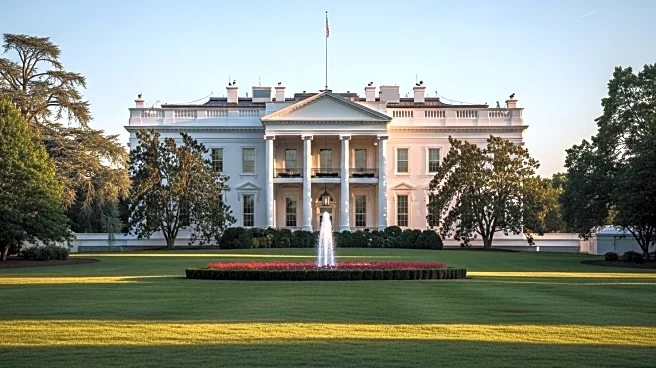What is the story about?
What's Happening?
President Donald Trump met with Pakistan's Prime Minister Shehbaz Sharif and Army Chief Field Marshal Asim Munir at the White House, marking a significant thaw in US-Pakistan relations. The meeting, attended by Secretary of State Marco Rubio, followed a trade deal between the two nations and a brief encounter at the UN General Assembly. Historically, the US viewed Pakistan as a strategic partner during the Soviet occupation of Afghanistan and the 'war on terror.' However, relations soured due to allegations of Pakistan supporting terrorism, notably after Osama bin Laden was found in Pakistan. Recently, Pakistan signed memorandums of understanding with the US, including agreements on supplying critical minerals and rare earth elements, and a US firm investing $500 million in Pakistani minerals. This development is part of a broader trade agreement involving tariffs on Pakistani imports and collaboration on oil reserves.
Why It's Important?
The meeting signifies a potential shift in US foreign policy towards Pakistan, which could impact regional stability and economic relations. The trade agreements and mineral supply deal suggest a strategic pivot, with Pakistan offering resources critical to US industries. This could enhance economic ties, with US goods and services trade with Pakistan reaching an estimated $10.1 billion in 2024. The warming relations may also influence geopolitical dynamics, especially in South Asia, where tensions between India and Pakistan persist. The US's engagement with Pakistan could alter its diplomatic stance in the region, potentially affecting alliances and conflict resolutions.
What's Next?
The continuation of high-level meetings and trade agreements suggests ongoing collaboration between the US and Pakistan. Future engagements may focus on further economic partnerships and strategic cooperation, particularly in energy and mineral sectors. The US's involvement in developing Pakistan's oil reserves could lead to increased investment and economic growth in Pakistan. Additionally, the diplomatic relationship may influence regional peace efforts, with potential US mediation in India-Pakistan conflicts. The nomination of President Trump for the Nobel Peace Prize by Pakistan highlights the diplomatic significance of these interactions.
Beyond the Headlines
The evolving US-Pakistan relationship may have deeper implications for global diplomacy and security. The focus on mineral resources and energy development reflects broader economic strategies, potentially affecting global supply chains and market dynamics. Ethically, the shift in relations raises questions about the US's stance on human rights and terrorism, given past allegations against Pakistan. Culturally, the engagement may foster greater understanding and collaboration between the two nations, influencing public perceptions and bilateral exchanges.


















